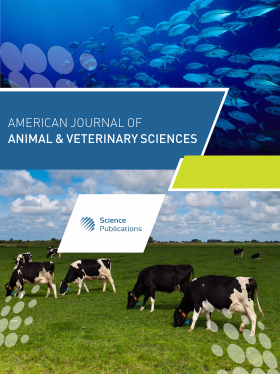Influence of Probiotics on Coccidia, H. Contortus and Markers of Infection in Goats
- 1 North Carolina Agricultural and Technical State University, United States
- 2 University of North Carolina at Greensboro NC 27401, United States
Abstract
Immunostimulants can induce nonspecific resistance against parasites. The use of probiotics to control development of animal gastrointestinal parasites could help reduce the risks of infestation. In this study, we investigated the effects of probiotics administration on gastrointestinal parasites coccidia, H. contortus and markers of infection. A cocktail of probiotics mix including Bifidobacterium longum, Bifidobacterium breve, Lactobacillus acidophilus, Lactobacillus reuteri and Lactobacillus rhamnosus (8.5 log CFU/mL) was drenched daily to three months-old male Spanish Boer kid-goats (n = 3) till four weeks of age. Control group of age matched kid-goats received sterile water daily for a 4-week period. Body weight, Fecal Egg Count, FAMACHA scores, Packed Cell Volume (PCV) and White Blood Cell Differential Count was determined weekly. Denaturing Gradient Gel Electrophoresis (DGGE) was used to monitor fecal bacteria using bacteria 16 sec rDNA primers. Pro-inflammatory cytokines, Prostaglandin2 (PGE2) and Immunoglobulin E levels in plasma were evaluated using commercial ELISAs. Results showed no significant difference in PCV, body weight, White Blood Cell Differential Count, FAMACHA score, PGE2 and IgE levels between probiotic drenched and control. However, eggs per gram were increased significantly (p<0.05) probiotics drenched 100, 90 and 120% at weeks 2, 3 and 4 for haemonchus and 70% for coccidia at week 3 respectively. An increase of 50 to 300% in pro-inflammatory cytokines was observed for probiotic drenched over control at weeks 2, 3 and 4. Pro inflammatory cytokine levels were significantly highest (p<0.05) for IFNr, G-CSF and IL-1α when pre-treatment levels were compared to week 4 for probiotic drenched. Results from PCR-DGGE analysis showed significantly increased fecal microbial DNA for probiotics drenched (p<0.05), with no difference in band pattern and staining intensity. Although increases in H. contortus count and Pro-inflammatory cytokine levels were observed, probiotics drenching had no effect against coccidia or H. contortus. This study supports the idea that use of probiotics in ruminants may be impacted by lack of microbial retention in the rumen. Further studies on establishment and retention are needed.
DOI: https://doi.org/10.3844/ajavsp.2016.91.99

- 7,442 Views
- 5,992 Downloads
- 9 Citations
Download
Keywords
- Coccidia
- Pro-Inflammatory Cytokines
- Goat
- H. contortus
- Probiotics
